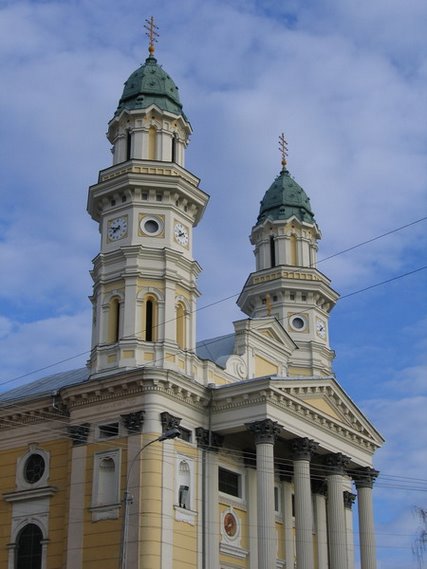Стівен Пфайфер про ризики та перспективи України
Колишній посол США в Україні Стівен Пфайфер на слуханнях в Сенаті по Україні.
Виступ 01.02.2012
(мовою оригіналу)
The Honorable Steven Pifer
Senior Fellow, Foreign Policy Center on the United States and Europe
The Risk to Kyiv
Democratic regression most destructively sets back the ability of the Ukrainian people to
have a free, fair, robust and competitive political system. It also has a destructive impact
on Mr. Yanukovych’s professed foreign policy.
Democratic backsliding puts at risk Ukraine’s relations with the West, in particular with the
European Union. As the EU President has indicated, the European Union does not intend
to proceed with signature of the association agreement and FTA until political
circumstances within Ukraine change. Even were it prepared to do so, the association
agreement and FTA must be approved by all 27 EU member states, and a number of
deputies in EU member-state parliaments have already stated that they would oppose
ratification so long as Ms. Tymoshenko remains in jail.
Moreover, given the current difficulties within the European Union, such as the eurozone
crisis, a number of member states believe that the EU’s attention should be focused
internally and that the European Union should slow the pace of its engagement with
neighboring states, particularly those which say they aspire to become EU members. For
those EU member states, democratic regression within Ukraine offers a handy reason to
justify slowing down the pace of EU relations with Kyiv. Even Kyiv’s traditional
advocates within the European Union—such as Poland, Lithuania and Sweden—appear to
be flagging in their support for Ukraine.
Mr. Yanukovych’s internal policies not only pose a major impediment to his goal of
drawing closer to the European Union, they also endanger his goal of having a balance
between Ukraine’s relations with the West and with Russia. Although Kyiv sought to
repair its relations with Moscow in 2010, the two countries’ interests simply diverge on
some issues. Take natural gas: a lower price for Ukraine means less revenue for Gazprom.
Likewise, construction and operation of the South Stream pipeline would reduce the flow
of gas through Ukrainian pipelines. Russian Prime Minister and presumptive President
Putin has called for creation of a Eurasian Union to serve as a counterpart to the European
Union. It is not exactly clear what the Eurasian Union might be in practice—and few other
post-Soviet states have expressed enthusiasm for the idea—but it is almost certain that one
of Mr. Putin’s goals is to increase Russian influence in the post-Soviet space.
With weaker relations with the West, Kyiv will find that is has less room for maneuver in
its dealings with Moscow. Tough negotiations will likely become even more difficult. Mr.
Yanukovych only has to look north to Belarus and what happened to President Lukashenko
once he had burned his bridges with the European Union and the United States following
the December 2010 crackdown on opposition leaders and demonstrators. Facing a dire
economic situation and with no hope for help from the West, Mr. Lukashenko struck a deal 8
with Moscow that secured a lower price for gas and a loan from Russia—at the price of
surrendering control of the Belarusian gas pipeline system to Gazprom.
It is not clear why Mr. Yanukovych is putting himself and Ukraine in this position. He has
regularly expressed a desire for closer relations with the European Union and a balanced
foreign policy. He may be allowing personal hostility toward Ms. Tymoshenko and a
desire to sideline her politically to dominate his decisions. Ironically, over the past year,
the government’s actions against Ms. Tymoshenko have focused public attention on her,
and her poll ratings and those of her party have increased significantly.
Mr. Yanukovych may also calculate that the European Union and the United States will
overlook his democratic regression and accept Ukraine without his having to adjust his
domestic policies, believing that the West does not want to see Ukraine drift closer to
Moscow’s orbit. That would reflect a fair measure of wishful thinking and overestimate
the geopolitical importance that the West currently attaches to Ukraine.
Crystallizing a Choice
Some Ukrainian officials likely will warn that this kind of approach by the United States
and European Union will cause Ukraine’s leadership to turn toward Russia. Western
officials should not be taken in by this. If Ukraine truly wants to join Europe, then its
leadership must accept the democratic values that prevail in Europe. If the leadership is not
prepared to adopt such values, then how can Europe and the West integrate Ukraine?
Moreover, Kyiv does not wish to fall too closely into Moscow’s orbit. Mr. Yanukovych
does not want to compromise Ukrainian sovereignty; he wants to be the leader of a fully
independent state. The Ukrainian elite and public likewise overwhelmingly support an
independent and sovereign Ukrainian state. For the Ukrainian oligarchs—who control so
much of the Ukrainian economy—the Russian model holds little appeal.
The overall goal of U.S. and European Union policy thus should be to crystallize in Mr.
Yanukovych’s mind the following choice. He can have a more authoritarian political
system, more difficult relations with the West, and a greatly weakened hand in dealing with
Russia, or he can return to a more democratic approach and have a stronger relationship
with the West and a balanced foreign policy. In the end, Mr. Yanukovych has reasons to
opt for the latter course. The West should face him with the choice as clearly as possible.
Джерело тут:







No comments:
Post a Comment